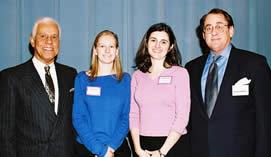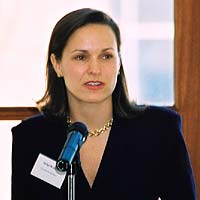 |
|
| Left to right: Former Virginia Governor Douglas L. Wilder, Conference Co-Chairs Lise Adams '03 and Abra Edwards '02, and Dean John Jeffries. | |
Caplin
Public Service Center Draws In Students
"Each time a man stands up for
an ideal or acts to improve the lot of others, or strikes
out against injustice, he sends forth a tiny ripple of hope,
and crossing each other from a million different centers,
those ripples build a current which can sweep down the mightiest
walls of oppression and resistance." THOMAS JEFFERSON BELIEVED The Mortimer Caplin Public Service Center is the school's focal point for public service training and outreach. The Center oversees the Law School's public service job placement efforts, and administers voluntary pro bono programs that introduce students to the rewards of community service, coordinates summer internships and postgraduate fellowships, and provides individualized career counseling. Indeed, more Law School students are becoming involved in the vast range of public service law every year, said Center Director Kimberly Carpenter Emery '91. "Virginia students are very dedicated. Last year alone we had a sixty percent increase in the number of students requesting interviews through the Public Interest Job Fair, and a record number applied for Student-Funded Fellowships to enable them to work in public interest over the summer. We practically doubled the number of pro bono hours completed last year," she added. More information on the various
pro bono projects, fellowships, awards, and job fair is
available at: www.law.virginia.edu/publicservice. |
Third Annual Conference Explores
Public Service and the Law
By Lise Adams '03 and
Abra Edwards '02
"Let your training as lawyers kindle, not define, your passion for justice."—ELI J. SEGAL
The third annual Conference on Public Service and the Law, held on February 15-16, brought together more than 340 students, faculty, litigators, and policy makers for an exploration of various public interest issues facing the legal community. The largest such conference to date and one of just a handful in the nation that brings together law students and faculty, attorneys, and policymakers, the conference explores public interest issues facing today's legal community.
The conference featured a diverse group of speakers on nine panels, each moderated by a Law School professor, covering electoral reform, First Amendment law, legislative and political affairs, community and economic development, gender and the law, bioethics, international law, environmental justice, and racial profiling. In addition, for the first time, the conference included Friday afternoon workshops on judicial clerkships and direct services and legal advocacy, both of which proved very popular among students. According to Law School Dean John Jeffries the 2002 Conference was "a great success" and the large number of participants represented "a tremendous expression of interest in public service."
On Friday evening, Eli J. Segal, founding CEO and President of AmeriCorps, former President of the Welfare to Work Partnership and assistant to President Clinton, opened the conference with an inspiring speech on the obligation of today's law school graduates to serve their communities. "Let your training as lawyers kindle, not define, your passion for justice," Segal said. "One of the best ways you can improve your community is to be an advocate for the unrepresented. Find a way to make a difference for someone who has less than you. Go forth and make waves," he said, adopting Robert F. Kennedy's words.
The next day, Helgi C. Walker '94, Associate Counsel to President Bush, delivered the luncheon address, stressing the importance of volunteerism. Walker outlined President Bush's expanded AmeriCorps program and the impact it will have in encouraging public service in our nation.
Former Virginia Governor L. Douglas Wilder delivered the keynote address. Following introductory remarks by Dean Jeffries, Wilder reflected on his experience as the grandson of slaves, growing up in Virginia, pursuing a legal career, and eventually being elected the first African-American governor in United States history. Wilder, who currently serves as chairman of Governor Mark R. Warner's Commission on Efficiency and Effectiveness, also discussed the protracted budget crisis in Virginia.
 |
| Helgi Walker '94, Associate General Counsel to President Bush, stressed volunteerism in her address. |
Responding to the September 11 tragedy, the conference featured a plenary session on national security law, with introductory remarks provided by former National Security Advisor Samuel R. Berger. "We need to accept that September 11 is not an isolated incident," Berger said. "It brought home that what happens in the rest of the world matters to us." Berger explained that the United States must wage the war on terrorism, but must simultaneously address the disparities between wealthy and poor nations, which tend to incite international discontent. "We have to be even more engaged in the Middle East to break the cycle of violence and end the bloodshed between Israelis and Palestinians," he said.
Following Mr. Berger's remarks, a panel co-sponsored by the Miller Center for Public Affairs at the University of Virginia, discussed national security law. The panel-Rachel King, Legislative Counsel for the ACLU, Larry Parkinson, General Counsel for the FBI, and Fred Hitz, former Inspector General to the CIA-analyzed the strengths and weaknesses of the anti-terrorism legislation passed in the wake of September 11, and addressed how further legislation in this field might achieve a balance between individual civil liberties and national security concerns.
The conference was free to all participants. Further, conference planners were able to reinstate travel stipends for non-UVA law students so that law and undergraduate students from NYU, University of Minnesota, Syracuse, City University of New York, Columbia, University of North Carolina, Vanderbilt, American, Howard, Georgetown, George Washington, Johns Hopkins, Mary Baldwin, Appalachian Law School, Washington & Lee, and Catholic University were able to attend.
This year's conference highlighted the broad range of opportunity and experience available to those who choose to practice law in the public interest, whether through pro bono, government service, employment with a non-profit organization, or politics.
The 2003 conference, scheduled for March 14 and 15, promises to be the largest and most comprehensive to date. With the specific goals of expanding the workshop program and doubling the attendance of non-UVA students, the conference is on track to achieve its broader aim of becoming the most prominent student-organized public service event in the Mid-Atlantic region. This year's panel topics will include civil rights, First Amendment law, criminal law, international development, corporate responsibility, and many others. New workshop topics will likely include government employment and pro bono opportunities at private firms. For a complete and up-to-date list of speakers and organizers, please visit the conference website at www.geocities/uvaconference. Registration is free and all are welcome to attend.
Lise Adams '03, daughter of Glenn Adams '66, was the recipient of the 2002 Caplin Public Service Fellowship. Abra Edwards '02 was awarded the Robert F. Kennedy Award for Public Service at graduation. Lise and Abra were joint organizers of the Conference.





